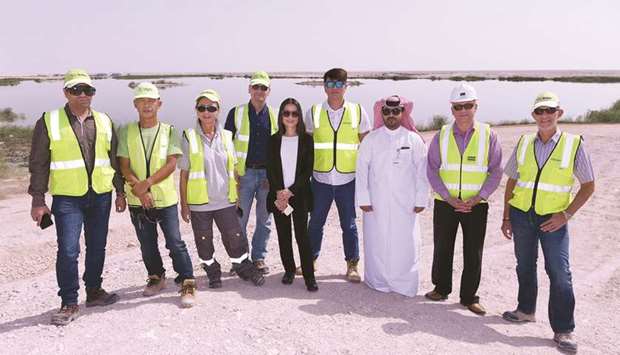The biodiversity of the ponds and lagoons created by a wastewater treatment plant is to be catalogued by a scientist from Weill Cornell Medicine – Qatar (WCM-Q).
The rehabilitation of Al Karaana Lagoons began in 2017, augmented by a package domestic wastewater treatment plant in the vicinity.
Since then the area, which is approximately 60km southwest of Doha off Salwa Road, has become a haven for wildlife and is particularly rich in bird life.
Dr Kuei-Chiu Chen, associate professor of biology at WCM-Q, will now lead a study documenting the many different species at the site and the numbers in which they are found.
Dr Chen said: “Because Qatar is historically a dry, desert country with no standing fresh water, it will be fascinating to see the difference that Al Karaana Lagoons has made to the biodiversity of the local area.
“We know that Qatar is on the migratory route for many species of birds and Al Karaana may well become a vital stopping-off point, allowing them to rest, drink and feed on their way to their destination.”
Dr Chen will conduct the research with the help of students studying the pre-medical curriculum at WCM-Q, giving them valuable experience of contributing to a professional research project.
The data they accumulate will be then compared to pre-2017 ecological studies at Al Karaana Lagoons, before the wastewater was treated. Studies will be done during both day and night, and a drone will also be utilised to assess where the greatest concentrations of plants and wildlife are. The study will also feed into Qatar National Vision 2030 - which has environmental development as one of the its four central pillars - potentially providing evidence for the long-term protection and sustainability of the site. Species which may be found at the treatment works include bee eaters, storks and even ospreys, as fish have been introduced to the lagoons.
Khalid Saif al-Khayareen, manager, Drainage Networks Projects Department, Public Works Authority, said, “Qatar National Vision 2030 is of the utmost importance to Ashghal and we will do all we can to help our nation achieve its goals.
The treatment of the wastewater and hence the creation of this remarkable habitat for birds, plants and fish - right in the heart of the desert - is a significant achievement and a source of pride for everyone who has worked on the project.
“This collaborative study with Weill Cornell Medicine – Qatar will help us to evaluate the success of the programme and is of genuine interest to everyone involved with the revitalisation of the lagoons. We hope they will continue to attract wildlife and be an example of environmental sustainability for many years to come.”
The environmental remediation of Al Karaana Lagoons began in 2017 and will be completed by the end of this year; currently fresh, treated effluent water is being added at a rate of approximately one bathtub per second, enough to offset evaporation even during the height of summer.
When finished, the three lagoons will have a total area of 730,000sq m providing a desert oasis for plants and wildlife.

Dr Kuei-Chiu Chen with Ashghal employees and contractors who have helped create the lagoons.
